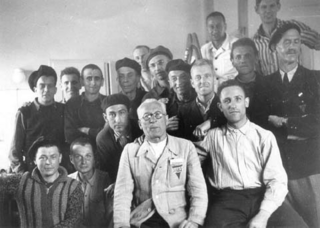Erich Fein

Personalia
Born:
Died:
Profession:
KZ Number:
Memberships
Curriculum Vitae
Erich Fein was born in Vienna into a Jewish family as the legitimate son of the worker Alexander Fein and Adele Fein. After completing his schooling, he became a goldsmith's assistant and later resigned from the Israelitische Kultusgemeinde (IKG). In 1927, he joined the Socialist Workers' Youth, the Social Democratic Workers' Party (SDAP) [today: SPÖ]. After ideologically turning to communism, he was expelled from the Socialist Workers' Youth in 1931 and joined the Communist Youth Association in the same year. In September 1931, he visited the Soviet Union as part of a youth workers' delegation.
After joining the Austrian Communist Party (KPÖ), he soon became the person responsible for organization in the Vienna city leadership. He took part in the socialist uprising in Termitz in February 1934. On April 11, 1935, he was arrested at an illegal meeting of the trade union youth and was imprisoned until December 12, 1935 for distributing a leaflet and being active in the illegal Proletarian Youth. Between February 27, 1936 and September 15, 1936 and between December 7, 1937 and February 18, 1938, he was held in the Wöllersdorf detention camp. He was released thanks to an amnesty granted by Federal Chancellor Kurt von Schuschnigg.
On March 12, 1938, Erich Fein witnessed the demise of a free and independent Austria with the invasion of the German Wehrmacht. With the occupation of Austria, German legislation was adopted and with it the 'Nuremberg Race Laws', according to which Erich Fein was considered a 'full Jew'.
On March 13, 1938, he was arrested by the Gestapo and detained in the 'Notarrest' Karajangasse in Vienna's 20th district. On April 2, 1938, he was deported to the Dachau concentration camp on the so-called 'Prominent Transport'. From there, he was transferred to the Buchenwald concentration camp on September 23, 1938. He remained there until the end of the war and was liberated by the US Army on April 11, 1945.
On his return to liberated Austria and the re-established republic, Erich Fein began working as an editor for the Communist Party (KPÖ). In 1946, he married Pia Aigner, but the marriage broke up. In 1954, he married Hildegard Mattes, who had also been persecuted under the National Socialists, and became the father of a daughter. In 1957, he became Secretary of the KZ-Verband and later Vice President of the Documentation Archive of Austrian Resistance (DÖW), which was founded by the KZ-Verband, the Bund Sozialistischer Freiheitskämpfer und Opfer des Faschismus and the ÖVP-Kameradschaft der politisch Verfolgten und Bekenner für Österreich.
He died at the age of 73 in St. Pölten.
On March 13, 1938, Erich Fein was arrested by the Gestapo and detained in the 'Notarrest' Karajangasse in Vienna's 20th district. On April 2, 1938, he was deported to the Dachau concentration camp on the so-called 'Prominent Transport'. From there, he was transferred to the Buchenwald concentration camp on September 23, 1938. In the concentration camp, he fell ill with pulmonary tuberculosis and stomach ulcers at the end of 1943. He remained in Buchenwald concentration camp until the end of the war and was liberated by the US Army on April 11, 1945.
Back home in liberated Austria and the re-established republic, Erich Fein began working as an editor for the Communist Party (KPÖ). In 1946, he married Pia Aigner, but the marriage broke up. In 1954, he married Hildegard Mattes, who had also been persecuted by the National Socialists, and had a daughter. In 1957, he became Secretary of the KZ-Verband and later Vice President of the Documentation Archive of Austrian Resistance (DÖW), which was founded by the KZ-Verband, the Bund Sozialistischer Freiheitskämpfer und Opfer des Faschismus and the ÖVP-Kameradschaft der politisch Verfolgten und Bekenner für Österreich.

He dies at the age of 73 in St. Pölten.
Places
Residence:
Persecution:
Citations
Wiener Stadt- und Landesarchiv (WStLA)
Dokumentationsarchiv des österreichischen Widerstands (DÖW)
